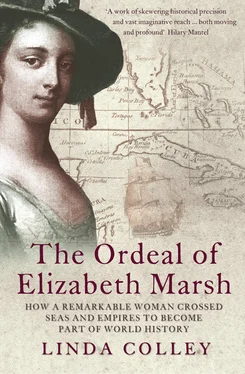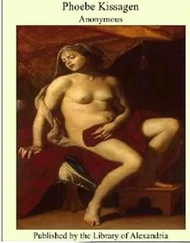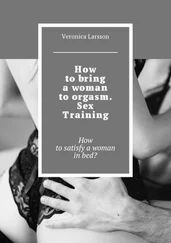It becomes still more so when Jaime Arvona returns with ‘a basket of fruit … [and] a variety of flowers’, and an order that she accompany him once more to the palace. She dresses herself, she will write, ‘in a suit of clothes, and my hair was done up in the Spanish fashion’. 59 True or no, this is a wholly exceptional detail. Nowhere else in any of her writings does Elizabeth Marsh comment on her appearance, except to note its deterioration. During the various journeys and emergencies that make up her life, she may record that her hair is becoming brittle, or that her complexion is burnt, or that she is eating too much, or that she is sick, but the only gesture of physical vanity she admits to is before this second meeting with Morocco’s thirty-five-year-old acting ruler. As before, her errand takes her through gardens and buildings that are aesthetically mixed. Now that Morocco and Denmark are in commercial alliance, the acting Sultan has secured a succession of royal Danish gardeners who are busy redesigning three of the gardens in his palace complex, creating walkways of trees, intricate mazes and flowerbeds. The interior of Sidi Muhammad’s stone and marble palace is also, seemingly, a study in hybridity. There is traditional mosaic work and glazed tiles in geometric designs, but there is also a smattering of Western consumer goods: ‘several fine European pier glasses with very handsome hangings’ in the royal apartments, for instance, and ‘in each room is a fine gilt branch for wax candles’. 60 This is not a straightforward act of emulation of Western tastes, however. In Islamic tradition, light possesses a divine quality as the visible manifestation of God’s presence and reason. As he consistently tries to do, Sidi Muhammad has borrowed from the West with premeditation, for his own purposes and in his own way.
The man himself is
tall, finely shaped, of a good complexion … Dressed in a loose robe of fine muslin, with a train of at least two yards on the floor; and under that was a pink satin vest, buttoned with diamonds. He had a small cap of the same satin as his vest, with a diamond button. He wore bracelets on his legs, and slippers wrought with gold. His figure, altogether, was rather agreeable, and his address polite and easy.
As this suggests, it is primarily in terms of surfaces and commodities, and their seductive power, that Elizabeth Marsh describes this second palace encounter. She is offered not traditional coffee, but tea, a re-export from Asia. It arrives in ‘cups and saucers which were as light as tin, and curiously japanned with green and gold. These I was told were presents from the Dutch.’ This is one of the details that confirm that she did indeed witness the royal apartments of Sidi Muhammad’s palace. Earlier in 1756, the Dutch government and the VOC, the Dutch East India Company, had sent the acting Sultan a series of presents in the hope of securing a commercial treaty with Morocco: luxury textiles, a coach, ornamented pistols, and these cups and saucers that were probably, like the tea, imported from China and Batavia (today’s downtown Jakarta). It is with yet more international commodities that the acting Sultan makes his proposition:
A slave brought a great collection of rarities, which were the produce of different nations, and shewed them to me. I greatly admired everything I saw, which pleased the Prince exceedingly; and he told me, by means of the interpreter, that he did not doubt of my preferring, in time, the palace to the confined way of life I was then in; that I might always depend on his favour and protection; and that the curiosities I had seen should be my own property.
Elizabeth Marsh rejects his suggestion. She reiterates through the interpreter that she is married to James Crisp, and that she does not ‘wish to change my situation in that respect, and whenever it was agreeable to him, I would take my leave’. 61
Instead, she is passed on to one of Sidi Muhammad’s women, seated at the opposite end of the room. Elizabeth Marsh describes her, too, in terms of surfaces and commodities. But while the acting Sultan, who aspires to be a merchant of sorts, is surrounded by the products of transoceanic trade, this lesser, female being is mainly, though almost certainly not entirely, Moroccan in ornament:
She had a large piece of muslin, edged with silver, round her head and raised high at the top; her ear-rings were extremely large, and the part which went through the ears was made hollow, for lightness. She wore a loose dress … of the finest muslin, her slippers were made of blue satin worked with silver.
Dressed in fine Indian textiles, which have perhaps also been presented by the Dutch, or which may have been shipped across the Indian Ocean by Arab or Asian traders, this woman converses with Elizabeth, using as her interpreter a French boy-slave who is young enough to be allowed in the company of the acting Sultan’s harem. 62
It is at this point that the narrative changes in quality and tone.
Given the quantity and quality of detail she supplies, much of it unavailable in any other English-language source at this time, there can be no doubt that Elizabeth Marsh did have at least one close encounter with Morocco’s acting ruler in the inner rooms of his Marrakech palace. It is probable too that he sought to retain her there for sexual purposes. But what kernel of accuracy there is in Elizabeth’s scarcely believable account of what happens now, when she is in the company of the acting Sultan’s woman, is simply unknowable. As she tells it, the French boy assures her that the Moroccan woman alongside her is merely uttering routine pleasantries. Since the woman appears friendly and waves her hands as if making gestures of encouragement, Elizabeth risks repeating some of her words. What she inadvertently says, or attempts to say, is as follows: ‘ La ilaha illa Allah wa-Muhammad rasul Allah’ . This is of course the primal statement of Muslim commitment: the affirmation that there is no god but God, and that Muhammad is God’s prophet.
Unsurprisingly, on her speaking these words, ‘the palace was immediately in the utmost confusion, and there was every sign of joy in all faces’. Sidi Muhammad orders silence, and Elizabeth Marsh is taken swiftly out of the public rooms into a large, secluded apartment ‘much longer than broad, and crowded with women, but mostly blacks’, that is part of the seraglio. (There may be a small ring of truth here. An English slave at Sidi Muhammad’s court reported in the 1750s that it was the acting Sultan’s custom to have a black, that is a sub-Saharan, female slave bring his chosen women to his bed.) 63 Elizabeth waits there, both frightened and intensely curious, refusing offers of refreshments in case the food and drink are drugged. Then she is summoned to attend Sidi Muhammad once more, this time in a different, private apartment. He is
seated under a canopy of crimson velvet, richly embellished with gold. The room was large, finely decorated, and supported by pillars of mosaic work; and there was, at the other end, a range of cushions, with gold tassels, and a Persian carpet on the floor.
They converse again through an interpreter:
‘Will you become a Muslim? Will you properly consider the advantages resulting from doing as I desire?’
‘It is impossible for me to change my sentiments in religious matters, but I will ever retain the highest sense of the honour you have done me, and hope for the continuance of Your Highness’s protection.’
‘You have this morning renounced the Christian faith and turned Muslim. And a capital punishment, namely, burning, is by our laws inflicted on all who convert and then recant.’
‘If I am an apostate, it entirely proceeds from the fallacy of the French boy, and not from my own inclination. But if my death will give you any satisfaction, I no longer desire to avoid this last remedy to all my misfortunes. Living on the terms you propose would only add an accent to my misery.’
Читать дальше












